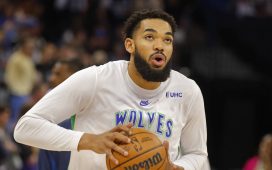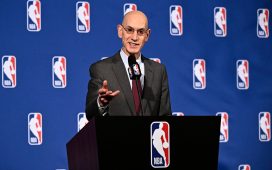Think of winning as the line on a vessel. You can fill it with blood, or you can fill it with water. You can fill it with grapefruit juice, motor oil. The important thing is that you exceed the line. That was the core of what the FreeDarko folks were getting at when they were first talking about the positional revolution back in the mid-aughts. You need players who can score and players who can guard the rim and the perimeter. Rebounders, playmakers, floor-spacers, screen-setters — it doesn’t particularly matter how these players are physically built or the skills they bring to the game individually. It matters what they add up to, the broader distribution of their talents. Your point guard can’t shoot, but everybody else on the floor can. You run a lot of your offense through your center. Your most gifted on-ball defender is 6-foot-9. Sometimes you throw him on guys who appear to be half his size. Whatever works.
This way of thinking about basketball has taken over the sport. It’s orthodox now, a big part of a coach’s job to figure out how to get his best players on the floor at the same time, without worrying about who’s technically at the four or the two. Fred VanVleet and Kyle Lowry form a terrific backcourt despite both being six-foot-nothing. Most teams over the past few seasons have at least experimented with five-out, centerless lineups. Kevin Durant graduated from small forward to power forward, and hardly anyone remarked upon it, because the distinction is pretty much meaningless.
It doesn’t really matter what position Ben Simmons plays, whether Doc Rivers calls him a point guard or a point forward or a left fielder. (Did you see him at center the other night? Glorious.) He might be the finest and is certainly the most versatile defensive player in the league. You can do whatever you want with him on that end of the floor. On offense, he can handle the ball, create for others and get to the rim, where his size and length make him a solid bet to finish against anybody. That he’s a bad and mostly unwilling shooter isn’t a huge problem when he’s initiating the offense, because if defenders sag off him, they’re giving him a fuller view of the floor, an uncluttered runway for his drives.
The issue with Simmons is that he can look lost off the ball. It’s a little bit strange that someone who’s such a good passer doesn’t understand how to get himself into positions where his teammates can feed him assists, but it’s difficult when so many ways of getting open—spotting up in the corner, running off screens, fading off his own picks—are nonstarters. He has to receive a pass near the basket or at least moving toward it in order to score, which means that Simmons is either crowding Joel Embiid’s realm or forcing the big fella to drift out to the perimeter. This isn’t the end of the world, and Embiid could actually stand to shoot a few more threes per contest, but it does result in games here and there where Simmons seems almost superfluous to what the Sixers are doing on offense. He’s definitely their second most important player, but there are nights when Shake Milton or Seth Curry are considerably more visible.
The Sixers are, by the way, the best team in the Eastern Conference, by record and by the eye test. Embiid might be your league MVP at this still early stage of the season, and the squad’s defense is outrageously good. Not unlike the Bucks or the Clippers, any success Philly has during the winter months is at best an indicator that maybe the Sixers won’t choke like the choking chokers they are once the playoffs come around. Nobody’s handing them a Finals berth just because they look awesome right now, especially with the Nets ascendant following the James Harden trade.
Still, you would of course rather be playing well than noticeably struggling (see: those damn Bucks), and perhaps more importantly, what Ben Simmons can’t do is no longer a topic of fervent discussion. Not to sound like one of those analysts who treats players like they cannot improve past age 24 and like they literally die at age 28, but Simmons isn’t a kid anymore. He’s more rock than magma at this stage, unlikely to build out bold new dimensions of his game. The possibility that he’ll simply never take more than a handful of shots outside 10 feet grows stronger all the time. That deficiency in his game hasn’t become less pronounced, but the valence on it has shifted. Maybe it’s OK that Simmons isn’t going to be a devastating all-around scorer, because he brings to the floor an abundance of other qualities that help you win basketball games. At some point the responsibility to provide spacing and shooting falls primarily on the Sixers’ front office and coaching staff. Let Simmons be poor at this one thing, so he can excel at so many others.
Whether you can win a title with that approach is an untested hypothesis. Unless Philly wants to ship Simmons out for Bradley Beal, it has no choice but to run the experiment. That sentiment might have carried a note of resignation or doom several months ago, but the Sixers are really soaring these days. It should be exciting to see what they’re capable of when the games truly matter. You normally wouldn’t dream of your second star putting up 11, 11 and 11 in a big playoff tilt, but if that’s what gets the Sixers where they’re trying to go, the shape of Ben Simmons’s contribution doesn’t have to make conventional sense. It only has to be enough.





